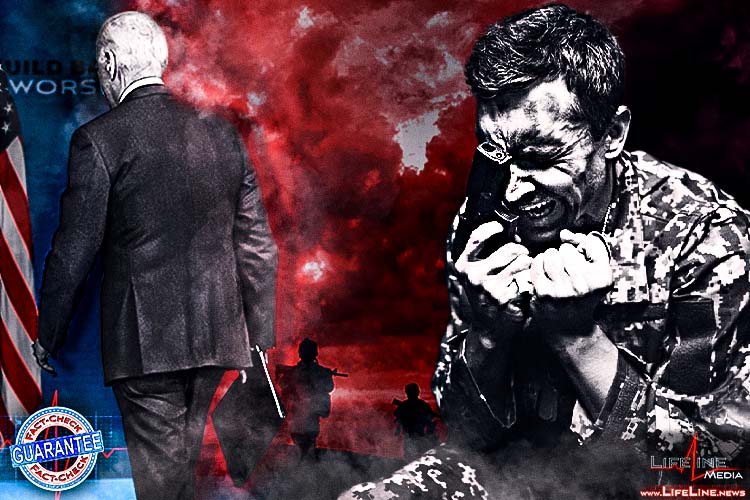
The crisis YOU need to know about and how WE can fix it!
Unearthing the most GUT-WRENCHING veteran statistics...
It’s YOUR responsibility because we ALL owe these men and women.
16 November 2021 | By Richard Ahern – There’s a crisis in America that you never hear the Biden administration talk about…
FACT-CHECK GUARANTEE (References): [Peer-reviewed research paper: 1 source] [Official statistics: 6 sources] [Medical authority: 1 source] [Government websites: 3 sources] [High-authority and trusted website: 1 source]
It’s not the crisis of illegal immigrant families needing reparations of almost $1 million, or the “pandemic of the unvaccinated”, and it’s definitely not the crisis of disgruntled parents being “domestic terrorists”.
No, it’s none of those “crises”.
It’s the crisis of patriotic Americans who have put their lives on the line to fight for the country they love being abandoned by that very thing.
It’s the veterans’ crisis.
It’s the men and women who would gladly die fighting for all of us being discarded like a used piece of equipment. The men and women who have suffered life-changing injuries from their service, in some cases it literally costing them an arm and a leg. It’s the men and women who wake up at night sweating, shaking, and crying, thinking they are still in that warzone.
Who is more deserving of government help than our veterans?
Of all people, none are more deserving of unconditional help from their government than the veterans who have fought to keep that government and all its citizens safe.
These are patriots that must not be forgotten, and this is a crisis that must be addressed.
Perhaps we can’t change the world with one article, but we can raise awareness about an important issue, and maybe after reading this, you can help spread the word.
We’ll take a deep dive into the most tear-jerking veteran statistics and examine some of the grim circumstances our heroes find themselves in.
Every American needs to know about this!
We’ll also discuss our analysis of the root cause of the veteran crisis, how the government can fix it, and how to help the veterans ourselves.
Are you ready to hear this?
Table of contents (jump to):
VETERAN IN CRISIS...
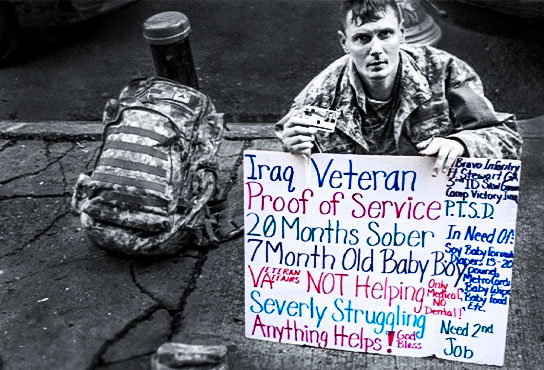
Our heroes are homeless
Some of the most shocking statistics are how many homeless veterans are in the United States.
When we look at how many homeless vets there are in proportion to the general population, we can begin to see how dire this crisis is.
How many homeless veterans are there?
- Around 40,000 veterans are homeless and without shelter on any given night in the US.
- 11% of all homeless adults are veterans.
But here’s something really interesting…
Of all US states, the Democrat-controlled California is miles ahead with the most homeless veterans. In 2020, California recorded 11,401 homeless veterans, the second-worst state for homeless vets was Florida, with a comparatively smaller 2,436.
Whatever way you look at it, there are far too many veterans needing housing.
Why are so many veterans homeless?
A joint study between Yale University and the VA Connecticut Health Care System in 2015 found that veterans are at a higher risk of going homeless than the rest of the population. The reason for this is down to factors we will examine shortly.
Mental illness is a leading cause of homelessness in vets, a large-scale VA study revealed that mental health problems are common among homeless veterans. Veteran statistics also point to substance abuse as a major cause of homelessness.
There’s more:
Unemployment contributes to the problem because veterans often have difficulty finding a job due to mental and physical problems.
Veteran mental health may be the reason that a lot of vets are going homeless, but equally, reducing homelessness would improve mental health. According to Wounded Warrior Homes, a growing body of research suggests that stable housing will reduce stress in veterans and help prevent suicide.
It seems shocking that the government would focus on housing immigrants from other countries when they can’t even house their veterans!
They need to get their priorities straight!
HOW MANY HOMELESS VETERANS IN US
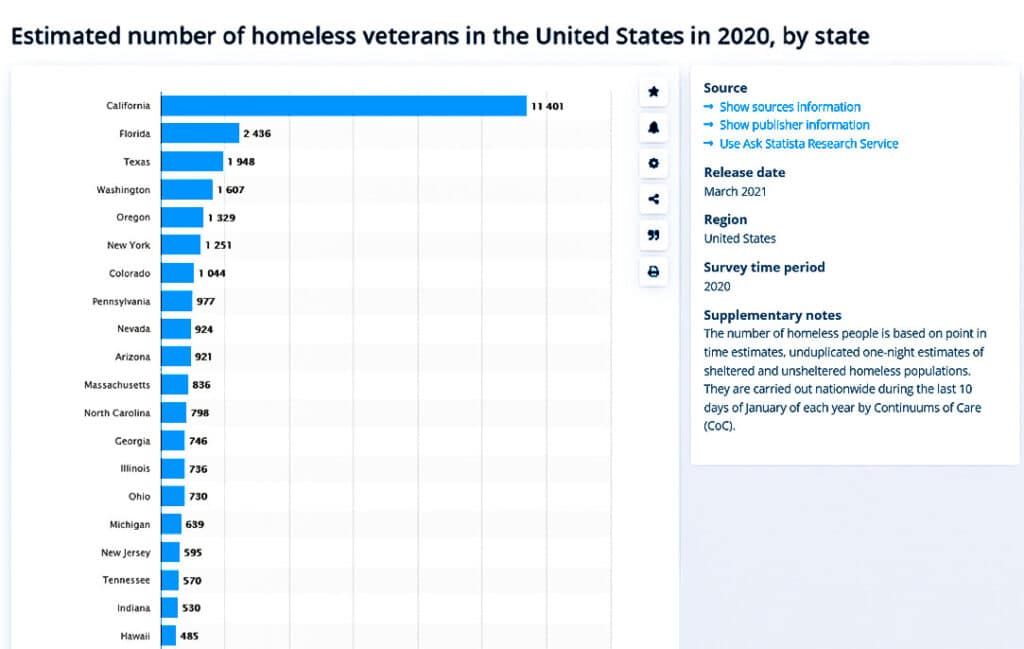
Unemployed heroes - veterans need jobs!
Unemployment is a serious problem with veterans.
Unemployment increases the chances of homelessness, substance abuse, and mental health problems.
The statistics don’t lie…
In 2020, there were 581,000 unemployed veterans in the United States.
Veterans find readjusting to civilian life difficult. Post-9/11 veterans appear to find readjusting to civilian life more difficult than pre-9/11 vets.
- 47% of post-9/11 veterans said it was very or somewhat difficult to readjust.
- Only 21% of pre-9/11 veterans said it was difficult to readjust.
Here’s the deal:
These findings suggest that support services for veterans appear to have deteriorated since 9/11.
Focusing on helping veterans adjust to civilian life and find a job could be the most important first step in preventing their lives from spiraling out of control.
Mental health problems may initially cause veterans to struggle to find employment, but when they can’t find a job, their mental health will worsen; it’s a vicious cycle with each factor connected.
For many people, being employed is an essential aspect of mental well-being, giving them a sense of purpose and meaning.
In the United Kingdom, the Mental Health Foundation warns that unemployment has a “profound effect” on mental health.
- 70% of UK adults feel unemployment has a negative effect on mental health.
- 45% of adults associated unemployment with “loss”.
- 25% called unemployment “trauma”.
These findings show that there is an indisputable link between unemployment and mental health.
That’s not all…
There may be an opportunity for the military itself to help reduce the number of veterans needing jobs.
Most veterans said the military did a good job at preparing them for service but not such a good job at preparing them for the transition to civilian life.
According to Pew Research, 91% of veterans say the training they received when they first entered the military prepared them very or somewhat well for military life. By contrast, only 52% of veterans say the military prepared them well for the transition to civilian life.
These statistics suggest that the military should provide further training for personnel before they leave the military.
This training should focus on developing skills that would be useful in civilian life, such as finding employment, writing a resume, and interviewing for jobs.
VETERANS NEED FINANCIAL HELP
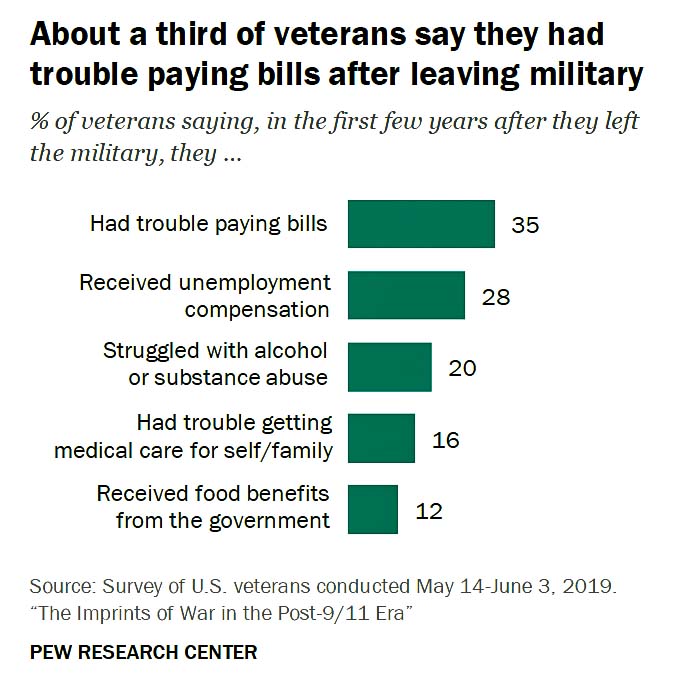
Our heroes need medical care
When it comes to medical care, not all veterans are looked after!
When it comes to medical care, not all veterans are looked after!
Almost 1.53 million veterans are uninsured and 2 million can’t afford care.
What help is available for veterans?
The Veterans Health Administration (VA) provides medical coverage for veterans but not all are eligible with around 1.5 million vets in need, an unacceptable number.
According to Pew Research, 16% of vets had trouble getting medical care for themselves and their families.
Let’s dig a little deeper…
The VA website states that to be eligible for coverage “you must have served 24 continuous months or the full period for which you were called to active duty.”
The VA health care provides services that help veterans improve their “ability to function” and enhance their “quality of life”, all services that would help veterans secure employment and gain financial stability.
The rather harsh eligibility requirement from the VA has resulted in 1.5 million veterans being abandoned when it comes to medical care.
Think about it:
As it currently stands, a veteran who has PTSD but doesn’t meet the VA eligibility requirements and can’t afford other care will be left to fend for themselves without vital mental health treatment. That same veteran could struggle with daily functioning, turn to alcohol or drugs, and ultimately end up unemployed and homeless.
It makes sense to conclude, that if the government provided more funding to the VA to allow them to expand their coverage to all veterans, it would help tackle unemployment and homelessness too.
Are veterans looked after?
Key Statistics
- Veterans are 50% more likely to commit suicide than people who have not served.
- Since 2001, over 114,000 veterans have died by suicide.
- It’s estimated that by 2030, the total number of veteran suicides will be 23x higher than the number of post-9/11 combat deaths!
- Approximately 20 veterans commit suicide each day in America.

- For veterans who served in the Iraq and Afghanistan war, around 11-20 out of every 100 (11-20%) are diagnosed with PTSD in any given year.
- 87% of veterans have been exposed to potentially traumatic events.
- The average veteran will have experienced 3.4 potentially traumatic events during their service.
- For veterans with PTSD, 61% said they had trouble paying their bills, 42% said they had trouble getting medical care for themselves and their families, and 41% said they struggled with alcohol or substance abuse.
- Almost half (47%) of post-9/11 veterans said it was very or somewhat difficult to readjust to civilian life.
- In 2020, there were 581,000 unemployed veterans in the United States.
- Around 40,000 veterans are homeless and without shelter on any given night in the US.
- In 2020, California recorded 11,401 homeless veterans, the second-worst state for homeless vets was Florida with a comparatively smaller 2,436.
- 11% of homeless adults are veterans.
- Almost 1.53 million veterans are uninsured and 2 million can’t afford care.
- Only 46% of veterans said the Department of Veterans Affairs (VA) was doing a good job.
The root cause: mental health
Veterans' mental health is the root of the crisis.
Based on many studies it seems that mental health is the leading cause of substance abuse, unemployment, and homelessness among veterans.
We would argue this is the root cause of the veteran crisis and is what the government needs to focus on.
No one can comprehend what going to war can do to the human psyche other than those who have experienced it.
We are not talking about a pink-haired college student who suffers panic attacks because their professor misgendered them.
Picture this:
We are talking about people who have been inches away from a bullet penetrating their brain. People who have seen their friend blown to bits by a landmine right in front of them.
Mental health support in most western countries is already lacking, but if anyone needs a priority to world-class mental health care, it is veterans.
Unfortunately, that is far from reality…
In a 2014 study, it was found that 87% of veterans have been exposed to potentially traumatic events. The average veteran will have experienced 3.4 potentially traumatic events during their service.
These traumatic events are likely to lead to a PTSD diagnosis. Post-traumatic stress disorder (PTSD) is a mental health condition triggered by a terrifying event. Symptoms include flashbacks, severe anxiety, nightmares, and uncontrollable thoughts.
These symptoms often impair day-to-day functioning, so adequate treatment is critical.
What percent of veterans have PTSD?
For veterans who served in the Iraq and Afghanistan war, around 11-20 out of every 100 (11-20%) are diagnosed with PTSD in any given year.
Veterans experiencing PTSD often have severe difficulties integrating into civilian life after service.
For example, of veterans with PTSD:
- 61% said they had trouble paying their bills.
- 42% had trouble getting medical care for themselves and their families.
- 41% struggled with alcohol or substance abuse.
Isn’t the Department of Veterans Affairs (VA) meant help?
Yes, it should, but it’s not doing enough!
When asked to assess the job the VA is doing for veterans, only 46% of veterans said they were doing a good job. That makes sense considering if they were doing a good job, a majority wouldn’t be struggling to pay their bills and get medical care!
How to help vets with PTSD…
With proper mental health treatment such as trauma-focused cognitive behavioral therapy and antidepressant medication, people can recover from PTSD and lead happy lives — but without proper care, symptoms can worsen and ultimately result in suicide.
This says it all:
- Veterans are 50% more likely to commit suicide than people who have not served.
- Since 2001, over 114,000 veterans have died by suicide.
- There has been an 86% increase in the suicide rate among 18-to-34-year-old male veterans since 2006.
This is shocking:
It’s estimated that by 2030, the total number of veteran suicides will be 23x higher than the number of post-9/11 combat deaths!
Here’s another way to think about it…
For further perspective, approximately 20 veterans commit suicide each day in America.
How is veteran suicide not a crisis?
The statistics clearly show veterans are suffering, the situation is getting worse, and a majority don’t feel they are getting the help they need.
How can the Biden administration talk about giving illegal immigrant families almost $1 million each when our heroes are crying for help?
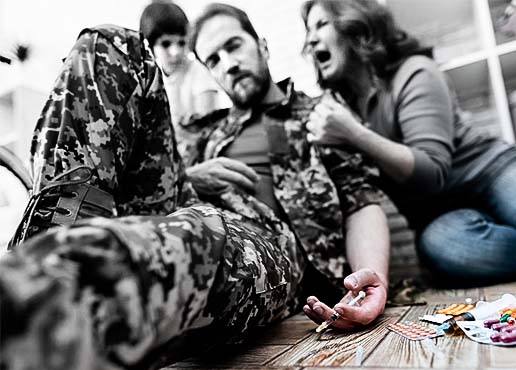
“Only 46% of veterans said the Department of Veteran Affairs (VA) was doing a good job.”
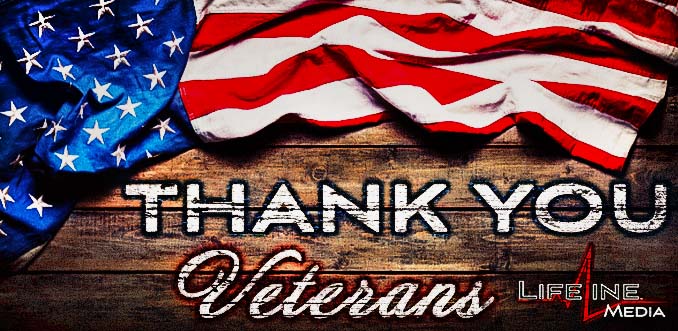
Veterans need help - how to support our veterans
Raising awareness about veterans needing help is the first step, share this article, tell your friends, and push your local politicians to help.
It all comes down to the federal government acknowledging the issue and then funding the places that matter.
Charity starts at home, all governments should put their citizens first, and none are more deserving than the veterans who have fought for the freedom we all enjoy.
Veterans need more benefits…
Simply giving the Department of Veteran Affairs (VA) enough funding to allow all veterans to be eligible for full physical and mental health care would make a huge difference.
The fact that there are 1.5 million veterans that need help and aren’t eligible for support, which would encompass the critical issue of treating PTSD and mental illness, is arguably the underlining issue.
The data clearly shows that most veterans struggle to find employment because mental health problems are holding them back. Helping them by treating issues like PTSD at the outset would allow them to adjust to civilian life faster, get back on their feet, and ultimately find employment and support themselves financially.
By tackling mental health care, we would increase employment which in turn would decrease homelessness and reduce suicide.
Until then, we can all make a difference by donating whatever we can, no matter how small, to the many noble charities that help veterans in need. Some veterans need help getting sober, other veterans need help paying rent, and some need help with medical care. Whatever they need, there are many great charities that can help.
What could be more important?
That’s why we at LifeLine Media donate 20% of ALL funding we receive from patrons and donors to support veterans.
Please consider helping us fight fake news, raise awareness of the veteran crisis, and ultimately help veterans by becoming a patron or making a one-off donation here.
Thank you for reading, and THANK YOU to all our veterans!
AUTHOR BIO
Richard Ahern
CEO of LifeLine Media
Richard Ahern is a CEO, entrepreneur, investor, and political commentator. He has a wealth of experience in business, having founded multiple companies, and regularly does consulting work for global brands. He has a deep knowledge of economics, having spent many years studying the subject and investing in the world’s markets.
You can usually find Richard with his head buried deep inside a book, reading about one of his plethora of interests, including politics, psychology, writing, meditation, and computer science; in other words, he’s a nerd.
By Richard Ahern – LifeLine Media
Contact: Richard@lifeline.news
Published: 16 November 2021
Last Updated: 17 April 2023
References (Fact-check guarantee):
- How Many Veterans Are Homeless in the US 2021: https://policyadvice.net/insurance/insights/homeless-veterans-statistics/ [Official statistic]
- Why Veterans Need Your Help: https://www.woundedwarriorhomes.org/who-we-are?gclid=EAIaIQobChMIxofmk9KR9AIVFevtCh1SHwnlEAAYASAAEgKH0PD_BwE [Official statistic]
- Estimated number of homeless veterans in the United States in 2020, by state: https://www.statista.com/statistics/727819/number-of-homeless-veterans-in-the-us-by-state/ [Official statistic]
- Risk Factors for Homelessness Among US Veterans: https://www.ncbi.nlm.nih.gov/pmc/articles/PMC4521393/ [Peer-reviewed research paper]
- Employment Situation of Veterans – 2020: https://www.dol.gov/agencies/vets/latest-numbers [Government website]
- Mental Health Foundation warns of “profound effect” of unemployment on public mental health: https://www.mentalhealth.org.uk/news/mental-health-foundation-warns-profound-effect-unemployment-public-mental-health [High-authority and trusted website]
- Key findings about America’s military veterans: https://www.pewresearch.org/fact-tank/2019/11/07/key-findings-about-americas-military-veterans/ [Official statistic]
- Eligibility for VA health care: https://www.va.gov/health-care/eligibility/[Government website]
- PTSD and Veterans: Breaking Down the Statistics: https://www.hillandponton.com/veterans-statistics/ptsd/ [Official statistic]
- Post-traumatic stress disorder (PTSD): https://www.mayoclinic.org/diseases-conditions/post-traumatic-stress-disorder/symptoms-causes/syc-20355967 [Medical authority]
- How Common is PTSD in Veterans?: https://www.ptsd.va.gov/understand/common/common_veterans.asp [Government website]
- Veterans are at 50% higher risk of suicide than their peers who have not served: https://stopsoldiersuicide.org/vet-stats [Official statistic]





Join the discussion!
Be the FIRST to comment on ‘Veterans in Need: LIFTING the Veil on the US Veteran CRISIS’